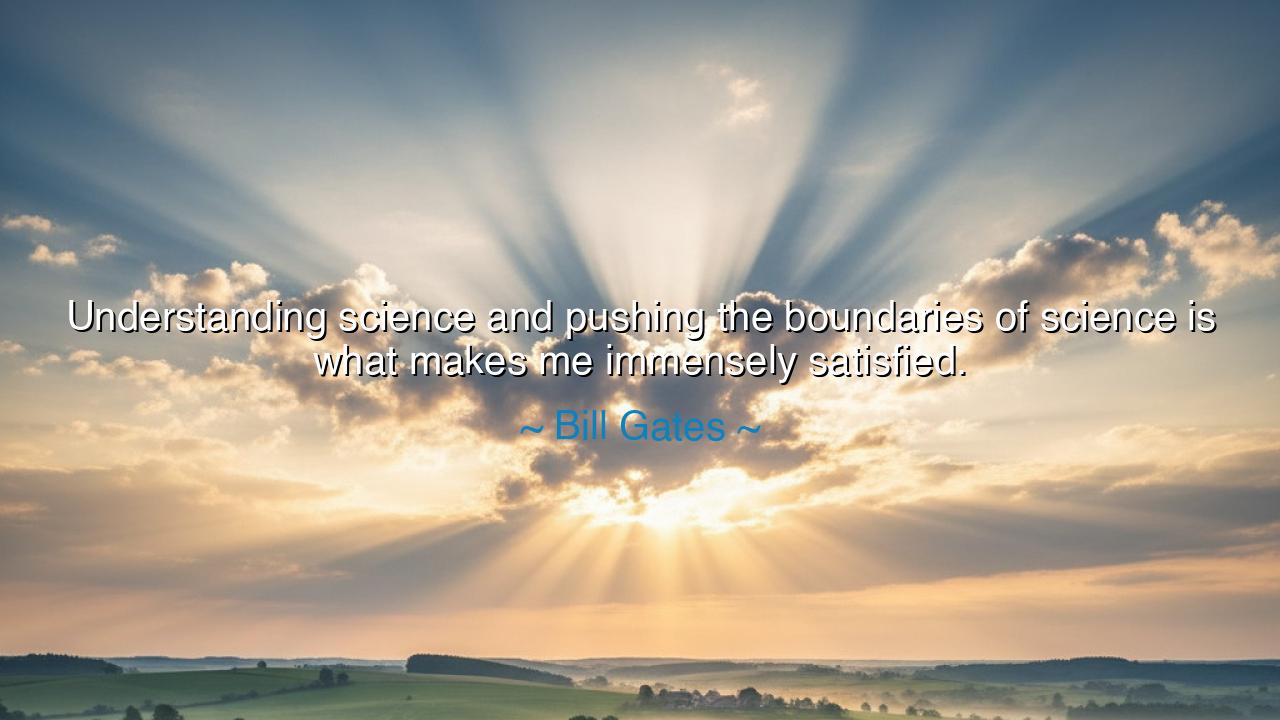
Understanding science and pushing the boundaries of science is
Understanding science and pushing the boundaries of science is what makes me immensely satisfied.






In the grand tapestry of human endeavor, few pursuits shine with the brilliance of scientific exploration. It is the quest for knowledge, the relentless desire to uncover the mysteries of the universe, that propels humanity forward. Bill Gates, a modern titan of technology and innovation, once spoke of the satisfaction that comes from understanding science and pushing its boundaries: "Understanding science and pushing the boundaries of science is what makes me immensely satisfied." These words carry a profound truth, for it is not the accumulation of wealth or the pursuit of personal glory that gives true meaning to life, but the act of seeking, discovering, and expanding the limits of human knowledge.
Gates' words echo the age-old yearning for understanding, a longing that has burned in the hearts of the great thinkers throughout history. The ancient Greeks, in their quest for wisdom, viewed science as not just the study of nature, but a sacred pursuit, a path to understanding the very order of the universe. Aristotle, in his writings, explored the natural world, laying the foundations for logic and empirical study. To the ancients, the pursuit of knowledge was seen as a noble calling, a path that led to enlightenment, and a way to serve both humanity and the divine. Like them, Gates speaks of a deeper satisfaction, one that comes not from the accumulation of riches or fame, but from the simple act of understanding the laws that govern the universe.
Consider the example of Isaac Newton, whose thirst for knowledge led him to discover the laws of motion and gravity. Newton, much like Gates, was driven not by the desire for recognition, but by an intrinsic satisfaction found only in the discovery of truth. He once said, "If I have seen further, it is by standing on the shoulders of giants," acknowledging that the pursuit of knowledge is an eternal, collective journey. Newton's satisfaction did not come from completing his theories, but from pushing the boundaries of what was known, advancing science and shaping the future of humanity. It is through such work, through the desire to explore and understand, that we move beyond the limitations of the present and into the future.
Gates' reflection also reminds us that the pursuit of science is not merely about acquiring knowledge for knowledge’s sake, but about using that knowledge to improve the human condition. In his own journey, Gates has sought to harness the power of technology not just for personal gain, but for the betterment of the world. His work with Microsoft and later his philanthropic efforts through the Bill & Melinda Gates Foundation show that true satisfaction comes not from the accumulation of resources, but from the application of knowledge to solve the problems that afflict society. The boundaries of science, once pushed, open up the possibility of creating a better, more equitable world.
The wisdom of Gates is akin to the teachings of the ancient sages—men and women who saw science as a means to better the world. In China, the great thinker Confucius believed that knowledge was not an end in itself, but a means to cultivate virtue and social harmony. Just as Confucius sought the betterment of society through moral education, Gates uses his understanding of technology to address global challenges such as poverty, disease, and education. The ultimate purpose of scientific inquiry, as Gates implies, is to push the boundaries of what is possible, not for the self, but for the collective good.
O children of the future, take heed of this lesson: the satisfaction that comes from understanding science is not the satisfaction of mere discovery, but the satisfaction of knowing that such discovery can be applied to improve the world. It is in learning, in exploring, and in pushing the boundaries of what is known that humanity moves toward its greater potential. But remember that true progress comes when we use our gifts—whether they be intellectual, creative, or technological—not for our own glory, but for the service of others. The pursuit of knowledge is a noble and infinite journey, one that connects us to the past, guides us in the present, and shapes the future for those who will come after us.
As you walk your path, remember that the pursuit of science is not merely a task for a select few, but a universal calling. Each of you has within you the ability to understand, to question, and to contribute to the betterment of the world through the knowledge you acquire. Let the example of Gates and the great thinkers of history inspire you to not only seek knowledge, but to use it wisely, to push the boundaries, and to serve the greater good. The journey is long, but it is in the pursuit of knowledge and understanding that we find the true meaning of our existence. Let science guide you, and in its discovery, may you find the satisfaction of having made the world a better place for all.






AAdministratorAdministrator
Welcome, honored guests. Please leave a comment, we will respond soon